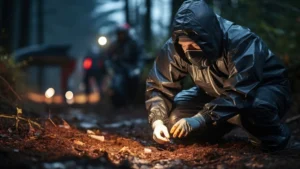The Evolving Landscape of Criminal Investigations
Modern crimes are increasingly complex, demanding specialized skills. Domestic violence cases require nuanced understanding of power dynamics and victim safety. Child abuse investigations necessitate specialized interview techniques to protect vulnerable victims. Homicide and death investigations demand advanced crime scene reconstruction and forensic analysis to uncover the truth. The rise of staged crime scenes challenges investigators to discern reality from deception. Furthermore, mental health crises are increasingly intertwined with law enforcement interactions, requiring officers to possess de-escalation skills and mental health awareness. The integration of technology, like drone usage, adds another layer of complexity. Crucially, these skills must be honed at every level, from the newest officer to the chief, ensuring a cohesive and effective response.
The Critical Need for Specialized Investigative Skills
Domestic Violence and Strangulation
Strangulation is a severe and often overlooked form of domestic violence. Recognizing its signs, such as petechiae, hoarseness, and difficulty swallowing, is crucial for victim safety. Specialized training provides officers with the tools to conduct thorough investigations, gather crucial evidence, and connect victims with necessary resources, preventing further harm.
Child Abuse Investigations
Child abuse cases require a sensitive and meticulous approach. Specialized interview techniques, like the NICHD protocol, are essential for eliciting accurate information without traumatizing the child. Forensic photography and detailed crime scene documentation are vital for building a strong case and ensuring justice for the victim.
Death and Homicide Investigations
Homicide investigations demand a deep understanding of forensic science. Advanced crime scene reconstruction techniques, including trajectory analysis and blood pattern interpretation, are essential for piecing together the events. Cold case investigations require meticulous review of evidence and the application of new technologies to uncover long-hidden truths.
Mental Health and De-escalation
Officers frequently encounter individuals experiencing mental health crises. Specialized training equips them to recognize signs of distress, employ de-escalation techniques, and connect individuals with appropriate mental health services. This not only protects the public but also ensures officer safety and well-being. Building resilience in officers to deal with the mental toll of the job is also very important.
Drone Usage and Staged Crime Scenes
Drones provide invaluable aerial perspectives for crime scene documentation and search operations. Training in drone usage ensures officers can effectively utilize this technology while adhering to legal and ethical guidelines. Recognizing staged crime scenes requires a keen eye for detail and a deep understanding of criminal behavior. Specialized training teaches officers to identify inconsistencies and uncover the true nature of the crime.
The Impact of Specialized Training on Department Effectiveness
Improved Case Clearance Rates
Specialized training leads to more thorough and efficient investigations, resulting in higher case clearance rates. Advanced techniques, like forensic analysis and specialized interview skills, provide crucial evidence that strengthens cases and leads to successful prosecutions.
Increased Officer Safety
De-escalation training and mental health awareness reduce the likelihood of violent encounters, minimizing officer injuries and fatalities. Proper crime scene processing, including the use of personal protective equipment, prevents exposure to hazardous materials and ensures officer safety.
Enhanced Community Trust
Departments that invest in specialized training demonstrate a commitment to professionalism and accountability. Effective investigations and community-oriented policing build trust and improve relationships with the public, fostering a safer and more collaborative environment.
Reduced Liability
Proper training reduces the risk of legal challenges and lawsuits. Officers equipped with specialized skills are less likely to make errors that could lead to wrongful convictions or civil liability.
Why Choose Our Specialized Investigative Training?
Our training programs are led by experienced instructors with real-world expertise in their respective fields. We offer a variety of training options, including online, in-person, on-site, and customized programs, to meet the specific needs of your department. Our curriculum is constantly updated to reflect the latest advancements in investigative techniques and technologies. We provide testimonials from satisfied departments and offer a free consultation to discuss your training needs.
Invest in your department’s future.
Contact us today for a free consultation and discover how our specialized investigative training can equip your officers with the skills they need to succeed in 2025.





